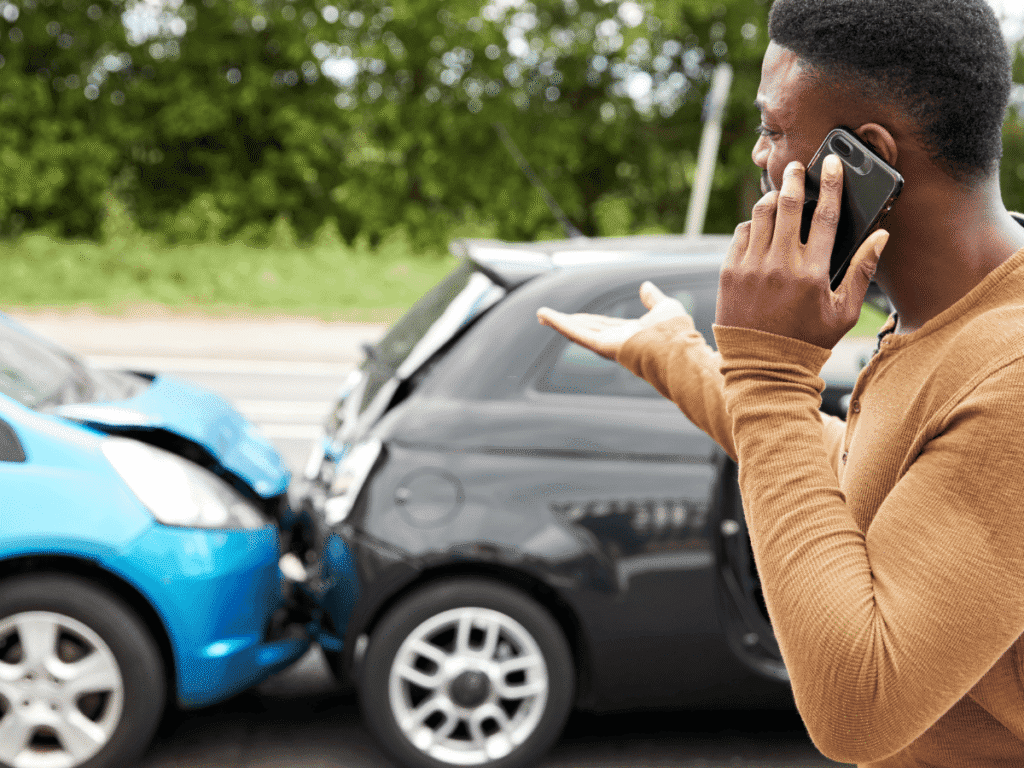
In most rear-end collisions, the driver in the rear is considered at fault. However, some exceptions can complicate matters and shift liability. Understanding these scenarios can help you determine rear-end accident liability, protect your rights, and ensure you receive fair compensation after an accident.
What Is a Rear-End Collision?
A rear-end collision occurs when one vehicle crashes into the back of another vehicle. These accidents are among the most common car crashes, making up nearly 29 percent of all traffic accidents in the United States.
Understanding who is at fault in these situations is essential for filing rear-end collision accident claims and pursuing legal action if necessary. But rear-end accident liability often hinges on the circumstances leading up to the collision, including:
- Traffic jams happen when sudden stops in heavy traffic catch drivers off guard.
- Distracted driving, which includes activities such as texting, talking on the phone, eating, or adjusting the radio, can delay a driver’s reaction time.
- Sudden stops due to an obstacle or traffic signal can result in the rear driver not having enough time to react.
- Bad weather, such as slippery roads caused by rain, ice, or fog, can increase stopping distances, leading to collisions.
Rear-end collisions can range in severity from minor fender benders to severe crashes that result in significant injuries. Even low-speed collisions can cause injuries like whiplash, spinal injuries, and traumatic brain injuries (TBI).
Who Is Typically at Fault in a Rear-End Accident?
In most cases, the driver of the rear vehicle is held responsible for a rear-end collision. This rule exists because drivers must maintain a safe following distance and be prepared for sudden stops. However, determining fault in a rear-end collision can be more complicated than it initially appears.
The Rear Driver Is Often at Fault
The rear driver is usually at fault in a rear-end collision for several common reasons. For example, In South Carolina, traffic laws require drivers to leave enough space between vehicles to stop safely. Tailgating, which happens when a vehicle follows too closely, violates these laws and can lead to rear-end accident liability for the rear driver.
Another example is when a driver fails to stop in time. Inattention, speeding, or failing to recognize a hazard can prevent a driver from stopping safely. Additionally, distracted driving, like texting, using a GPS, or adjusting the radio, can delay the reaction times of drivers. Moreover, driving under the influence of alcohol or drugs can reduce reaction times and decision-making abilities, leading to collisions.
When the Lead Driver Could Be at Fault
While the rear driver is typically at fault, there are scenarios where the lead driver may share or bear full responsibility for a rear-end collision. These situations include when a driver makes sudden or illegal stops without a valid reason, such as in the middle of the road or to make an illegal maneuver. Faulty brake lights of the lead vehicle can result in the rear driver not realizing the lead vehicle is slowing down. If the lead driver suddenly reverses into the rear vehicle, they are likely at fault. Also, driving too slowly on highways can create hazardous conditions that contribute to rear-end collisions.
How Do Insurance Companies Determine Fault in a Rear-End Collision?
Insurance companies rely on various forms of evidence to determine rear-end accident liability. Fault assessments impact whether a claim is approved and how compensation is distributed.
Evidence Needed to Prove Fault
The following types of evidence are crucial in determining fault in car accidents:
- Dashcam footage can provide clear, unbiased video recordings of what occurred before and during the accident.
- Eyewitness testimony can include statements from people who witnessed the crash to support your version of events.
- Police reports often include the assessment of fault based on the law enforcement officer’s investigation of the accident scene.
- Accident reconstruction specialists may analyze the scene, vehicle damage, and skid marks in complex cases to determine how the collision occurred.
- Photographs and videos of vehicle damage, road conditions, traffic signals, and debris can help establish what happened.
How Fault Affects Your Insurance Claim
If the rear driver is found at fault, their insurance typically covers damages to the lead vehicle, including repairs, medical expenses, and other costs. This is known as rear-end collision fault and insurance coverage. However, if the lead driver is at fault, the rear driver may file a claim with the lead driver’s insurance. Still, in some cases, both drivers may have some degree of fault, which can complicate the claims process and reduce each party’s compensation.
Can You Be Partially at Fault in a Charleston Rear-End Accident?
Yes, both drivers can share fault in a rear-end collision. While the rear driver is typically at fault, exceptions exist depending on the circumstances. Understanding rear-end accident liability, and the factors that influence fault can help you navigate the claims process.
Also worthy of noting is South Carolina’s “modified comparative negligence” rule. With this, you can recover compensation if you are 50 percent or less at fault. However, you are barred from recovering any compensation if you are 51 percent or more at fault. That’s why determining fault in a rear-end collision is crucial for protecting your legal and financial interests.
Protect Your Rights After a Rear-End Collision in Charleston
Fault affects insurance claims, premiums, and potential legal consequences. If you’ve been involved in a rear-end accident and are unsure about the process of rear-end collision accident claims, consulting a Charleston car accident lawyer with experience can help you understand your rights, gather evidence, and seek fair compensation.
Get legal guidance through the claims process and seek the compensation you deserve.
- Julian Allen belongs to the Multi-Million Dollar Advocates Forum
- Julian Allen was named as an AV Preeminent Lawyer by Martindale-Hubbell
- Julian Allen has experience working for the insurance companies
Contact a Charleston rear-end accident attorney at Allen Law at (843) 882-5005 for a free consultation today.

